Faculty
Dr. Susan Bazyk, Professor, Occupational Therapy Department, College of Health, has conducted research in the field of mental health promotion, prevention, and intervention for children and youth, after-school programming for low-income urban youth, and school-based practice.
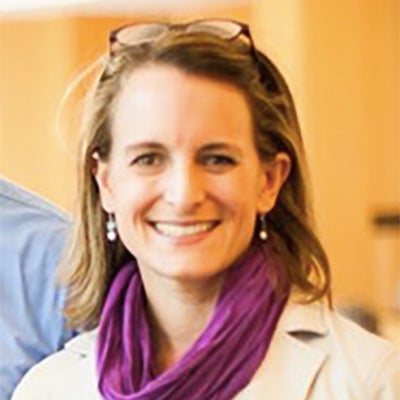 Dr. Cyleste C. Collins, Assistant Professor, School of Social Work, College of Health, is a mixed-methods researcher who focuses on understanding psychosocial processes in a cultural context, using cognitive anthropological theory and methods. Dr. Collins employs community-based participatory approaches and focuses on addressing the social determinants of health and health disparities.
Dr. Cyleste C. Collins, Assistant Professor, School of Social Work, College of Health, is a mixed-methods researcher who focuses on understanding psychosocial processes in a cultural context, using cognitive anthropological theory and methods. Dr. Collins employs community-based participatory approaches and focuses on addressing the social determinants of health and health disparities.
 Dr. Donald Allensworth-Davies, Associate Professor, Health Sciences and Human Performance Department, College of Health, focuses on LGBT health work, which includes substance use and mental illness as key factors in improving the health of LGBT communities. For several years, he worked with the AHEAD study in Boston, a randomized control trial funded by NIAAA/NIDA comparing the effectiveness of a multidisciplinary substance use clinic compared to the usual path of care.
Dr. Donald Allensworth-Davies, Associate Professor, Health Sciences and Human Performance Department, College of Health, focuses on LGBT health work, which includes substance use and mental illness as key factors in improving the health of LGBT communities. For several years, he worked with the AHEAD study in Boston, a randomized control trial funded by NIAAA/NIDA comparing the effectiveness of a multidisciplinary substance use clinic compared to the usual path of care.
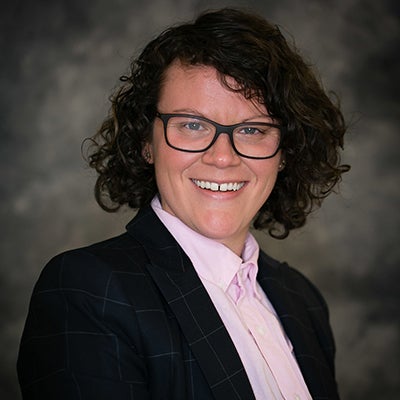 Dr. Kim Fuller, Assistant Professor, School of Social Work, College of Health, has been involved in research involving the role of culture, oppression, and marginalization in individuals’ ability to access resources and health care. She applies a culturally-informed perspective, where experiences are understood both individually and collectively.
Dr. Kim Fuller, Assistant Professor, School of Social Work, College of Health, has been involved in research involving the role of culture, oppression, and marginalization in individuals’ ability to access resources and health care. She applies a culturally-informed perspective, where experiences are understood both individually and collectively.
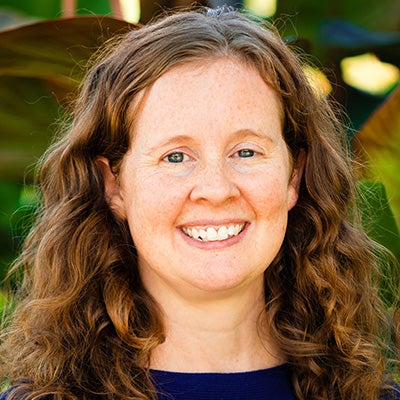 Dr. Elizabeth Goncy, Assistant Professor, Department of Psychology, College of Arts and Sciences, has research interests in understanding risk and protective factors for substance use/abuse, and other problem behaviors for adolescents and young adults. She is particularly interested in understanding how risk and protective factors for substance abuse and mental health concerns impact relationship quality.
Dr. Elizabeth Goncy, Assistant Professor, Department of Psychology, College of Arts and Sciences, has research interests in understanding risk and protective factors for substance use/abuse, and other problem behaviors for adolescents and young adults. She is particularly interested in understanding how risk and protective factors for substance abuse and mental health concerns impact relationship quality.
 Michele L. Heath, DBA., is an Assistant Professor in Management at Cleveland State University. Her research interests include the role of leadership, governance, culture, conflict, team composition, change management, and other core management concepts in the context of health information technology. She holds a MLHR from Fisher College of Business. Michele’s research has been published in a number of scholarly journals including Health Policy & Technology, Information Systems Management, and American Journal of Business. Her work has appeared in the following proceedings: Americas Conference on Information Systems, Southern Management Association Midwest Association for Information Systems, and Academy of Management. She has also presented her work at several national conferences. Prior to entering the academic field Dr. Heath spent 12 years at Ernst & Young in healthcare consulting.
Michele L. Heath, DBA., is an Assistant Professor in Management at Cleveland State University. Her research interests include the role of leadership, governance, culture, conflict, team composition, change management, and other core management concepts in the context of health information technology. She holds a MLHR from Fisher College of Business. Michele’s research has been published in a number of scholarly journals including Health Policy & Technology, Information Systems Management, and American Journal of Business. Her work has appeared in the following proceedings: Americas Conference on Information Systems, Southern Management Association Midwest Association for Information Systems, and Academy of Management. She has also presented her work at several national conferences. Prior to entering the academic field Dr. Heath spent 12 years at Ernst & Young in healthcare consulting.
Dr. William Morgan, Professor Emeritus, received his Ph.D. in sociology from the University of Chicago. He served as Vice Provost for Faculty Affairs, as Associate Dean for the College of Liberal Arts and Social Sciences and as Professor and Chair of the Department of Sociology. He has been the recipient of a NIH/NIDA R01 to study mothers’ drug treatment and children’s resiliency. Dr. Morgan has also been a Fulbright Scholar where he compared curriculum for criminology and deviance between Bayero University in Nigeria and Cleveland State University. His current research examines resiliency in a sample of 600 young adults first studied as children in 1995-2000 when their mothers were undergoing varying treatment modalities for serious drug dependency issues.
 Dr. Sandra Hurtado Rúa is an Assistant Professor, Department of Mathematics and Statistics, College of Arts and Sciences. She is interested in the development and application of Bayesian statistical methods to clinical, biological and social studies. Bayesian methods combine prior knowledge along with new data to model a particular system or answer questions about a problem of interest. Sandra Hurtado Rúa’s collaborative research includes counseling psychology, health disparities, mental health, multiple sclerosis and other clinical applications.
Dr. Sandra Hurtado Rúa is an Assistant Professor, Department of Mathematics and Statistics, College of Arts and Sciences. She is interested in the development and application of Bayesian statistical methods to clinical, biological and social studies. Bayesian methods combine prior knowledge along with new data to model a particular system or answer questions about a problem of interest. Sandra Hurtado Rúa’s collaborative research includes counseling psychology, health disparities, mental health, multiple sclerosis and other clinical applications.
 Dr. Elliott Ingersoll, Professor and Chair, Department of Counseling, Administration, Supervision & Adult Learning, College of Education and Public Affairs. Dr. Ingersoll’s primary research areas are in psychiatric diagnosis and nosology, psychotropic medication, and work in treating individuals suffering from substance use disorders.
Dr. Elliott Ingersoll, Professor and Chair, Department of Counseling, Administration, Supervision & Adult Learning, College of Education and Public Affairs. Dr. Ingersoll’s primary research areas are in psychiatric diagnosis and nosology, psychotropic medication, and work in treating individuals suffering from substance use disorders.
 Dr. Rama Jayanti, Professor and Fulbright Fellow, Department of Marketing, Monte Ahuja College of Business. Dr. Jayanti’s research pertaining to Online Health Interventions, Preventive Health Behaviors, and Pharmaceutical Marketing was featured in popular press and won her a number of research awards. She uses both qualitative and quantitative techniques in her research with special emphasis on netnographic tools for online research.
Dr. Rama Jayanti, Professor and Fulbright Fellow, Department of Marketing, Monte Ahuja College of Business. Dr. Jayanti’s research pertaining to Online Health Interventions, Preventive Health Behaviors, and Pharmaceutical Marketing was featured in popular press and won her a number of research awards. She uses both qualitative and quantitative techniques in her research with special emphasis on netnographic tools for online research.
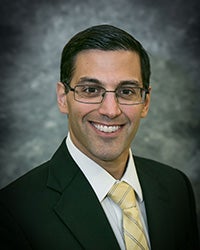
Dr. Billy Kosteas, Associate Professor and Chair, Department of Economics, College of Business, has expertise in using statistical techniques such as selection correction models and propensity score matching to help to identify causal effects of a treatment when the selection into the treatment group is not completely random. In terms of relevant research, Dr. Kosteas has conducted research on the determinants and labor market impacts of regular physical activity.
 Dr. Cathleen Lewandowski, Professor and Director of the School of Social Work, College of Health. She has conducted studies in the field of addiction, especially among women, as well as in child welfare. She has used focus groups of African-American women to examine their perceptions of the interface of HIV, substance abuse and other related concerns. She has also used mixed methods approaches to examine the impact of a multi-agency service environment, as well as social support on women’s drug treatment completion.
Dr. Cathleen Lewandowski, Professor and Director of the School of Social Work, College of Health. She has conducted studies in the field of addiction, especially among women, as well as in child welfare. She has used focus groups of African-American women to examine their perceptions of the interface of HIV, substance abuse and other related concerns. She has also used mixed methods approaches to examine the impact of a multi-agency service environment, as well as social support on women’s drug treatment completion.
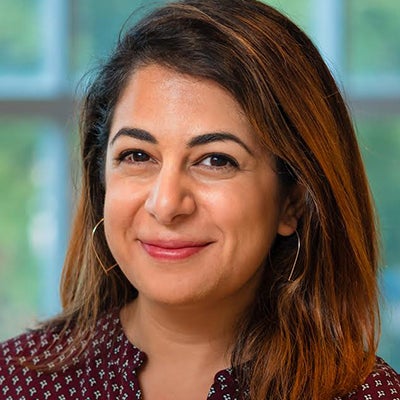 Dr. Shereen Naser, Assistant Professor, Department of Psychology, College of Arts and Sciences, research agenda focuses on addressing youth mental health in the school setting, and in developing interdisciplinary strategies to prevent mental health concerns among youth.
Dr. Shereen Naser, Assistant Professor, Department of Psychology, College of Arts and Sciences, research agenda focuses on addressing youth mental health in the school setting, and in developing interdisciplinary strategies to prevent mental health concerns among youth.
 Dr. Wendy Regoeczi, Professor and Chair, Department of Criminology and Sociology, College of Education and Public Affairs. Dr. Regoeczi’s research focuses on violent victimization, including homicide, domestic violence, and sexual assault. She has also worked with the Cuyahoga County Medical Examiner to examine trends over time in drug overdoses, suicide, and homicide. She has been awarded federal grants from the National Institute of Justice and the National Science Foundation. She has received multiple local grants to conduct program evaluations for criminal justice and social service agencies within Cuyahoga County, including Frontline Services, the Cleveland Municipal Court, and the Cuyahoga County Prosecutor’s Office.
Dr. Wendy Regoeczi, Professor and Chair, Department of Criminology and Sociology, College of Education and Public Affairs. Dr. Regoeczi’s research focuses on violent victimization, including homicide, domestic violence, and sexual assault. She has also worked with the Cuyahoga County Medical Examiner to examine trends over time in drug overdoses, suicide, and homicide. She has been awarded federal grants from the National Institute of Justice and the National Science Foundation. She has received multiple local grants to conduct program evaluations for criminal justice and social service agencies within Cuyahoga County, including Frontline Services, the Cleveland Municipal Court, and the Cuyahoga County Prosecutor’s Office.
 Dr. Tracy Porter, Assistant Professor, Department of Management, Monte Ahuja College of Business. Her research focuses on a variety of healthcare management topics including change surrounding electronic health records, trust in the healthcare field, and physician leadership. Her research has been presented at numerous international conferences and has been published in top journals such as Health Care Management Review. Currently, she is an Affiliate Academic Staff member at St. Vincent Charity Medical Center and is working closely with the Cleveland Clinic on a number of research topics. Prior to entering academe she specialized in large practice management and was a healthcare consultant for 15+ years.
Dr. Tracy Porter, Assistant Professor, Department of Management, Monte Ahuja College of Business. Her research focuses on a variety of healthcare management topics including change surrounding electronic health records, trust in the healthcare field, and physician leadership. Her research has been presented at numerous international conferences and has been published in top journals such as Health Care Management Review. Currently, she is an Affiliate Academic Staff member at St. Vincent Charity Medical Center and is working closely with the Cleveland Clinic on a number of research topics. Prior to entering academe she specialized in large practice management and was a healthcare consultant for 15+ years.
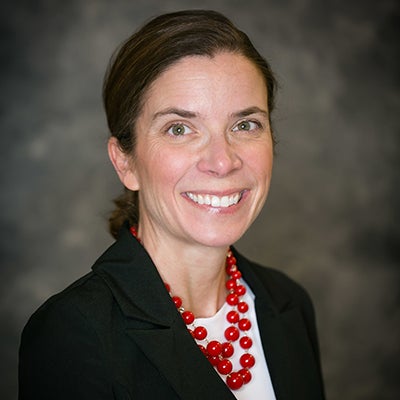 Dr. Patricia Stoddard Dare, Associate Professor, School of Social Work, College of Health, is a former mental health services research fellow with the National Institute of Mental Health. An expert in program evaluation, her research focuses on vulnerabilities experienced by children, youth and families such as substance use disorders, mental health issues, delinquency, limiting health conditions, maltreatment, food insecurity, and health policy.
Dr. Patricia Stoddard Dare, Associate Professor, School of Social Work, College of Health, is a former mental health services research fellow with the National Institute of Mental Health. An expert in program evaluation, her research focuses on vulnerabilities experienced by children, youth and families such as substance use disorders, mental health issues, delinquency, limiting health conditions, maltreatment, food insecurity, and health policy.
 Dr. Miyuki Fukushima Tedor, Associate Professor, Department of Criminology and Sociology, College of Education and Public Affairs, is trained as a quantitative criminologist. Her research has focused on theory testing of deviant behaviors using secondary data, focusing specifically on alcohol use, academic deviance, and juvenile delinquency.
Dr. Miyuki Fukushima Tedor, Associate Professor, Department of Criminology and Sociology, College of Education and Public Affairs, is trained as a quantitative criminologist. Her research has focused on theory testing of deviant behaviors using secondary data, focusing specifically on alcohol use, academic deviance, and juvenile delinquency.
 Dr. Ilya Yaroslavsky, Assistant Professor, Department of Psychology, College of Arts and Sciences. His research focuses on understanding how physiological, psychosocial, and familial factors contribute to the risk, long-term course, and outcomes of depressive disorders. His research aims to elucidate the relationship between depression risk, and ways that individuals attempt to attenuate emotional regulation and the modifying effects of physiological processes and contextual factors on successful emotional regulation responses. His research also seeks to clarify the roles of depression and emotion regulation deficits in increasing individual’s risk for substance use, as well as the extent that depression impedes substance abuse treatment outcomes.
Dr. Ilya Yaroslavsky, Assistant Professor, Department of Psychology, College of Arts and Sciences. His research focuses on understanding how physiological, psychosocial, and familial factors contribute to the risk, long-term course, and outcomes of depressive disorders. His research aims to elucidate the relationship between depression risk, and ways that individuals attempt to attenuate emotional regulation and the modifying effects of physiological processes and contextual factors on successful emotional regulation responses. His research also seeks to clarify the roles of depression and emotion regulation deficits in increasing individual’s risk for substance use, as well as the extent that depression impedes substance abuse treatment outcomes.